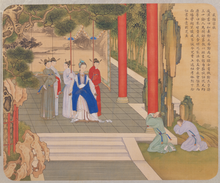
Back Deng Sui German Emperatriz Deng Sui Spanish Deng Sui Hausa Deng Sui ID 鄧綏 Japanese 화희황후 Korean Keiserinne Deng Sui NB Deng Sui Polish Carica Deng Sui Serbo-Croatian Deng Sui Swedish
| Deng Sui | |||||
|---|---|---|---|---|---|
| 鄧綏 | |||||
 | |||||
| Empress dowager and regent | |||||
| Successor | Empress Yan Ji | ||||
| Regent | 106 - 121 | ||||
| Empress consort of the Han dynasty | |||||
| Reign | 21 November 102 – 13 February 106 | ||||
| Predecessor | Empress Yin | ||||
| Imperial Consort | |||||
| Born | 81 Nanyang, Henan | ||||
| Died | 5 April 121 (Age 39-40) Luoyang, Henan | ||||
| Burial | Eastern Han Emperor Mausoleum | ||||
| Spouse | Emperor He of Han | ||||
| |||||
| Father | Deng Xun | ||||
| Mother | Lady Yin | ||||
Deng Sui (Chinese: 鄧綏; 81 – 17 April 121[2]), formally Empress Hexi (Chinese: 和熹皇后; lit. 'moderate and pacifying empress'), was an empress of the Eastern Han dynasty through her marriage to Emperor He of Han, and later its de facto ruler. Acting as regent twice for Emperor Shang, and then for Emperor An. Deng Sui was recognized as a merciful, intelligent leader who guided the dynasty well through a period of excessive natural disaster, disastrous famine, court intrigues, economic inflation and costly military conflicts, and she overcame all the problems and organized the government; as well as a staunch opponent of corruption and bribery, and an effective patron of education and the arts, which fostered growth and development in state. She is considered to be one of the Han dynasty's last effective rulers.
Beginning as an imperial consort to Emperor He, she managed to gain favor in the court through her humble and virtuous disposition, as well as her intelligence. She never wore lavish clothes, and refused any special privileges and gifts given to her. She gained the affections of He by expressing her concerns about him producing an heir, and suggesting other concubines that could possibly bear him one. Deng was also known for her beauty, which was recorded in many accounts and was undoubtedly the reason that He became enamored with her. Her influence in court caused He's wife, Empress Yin, to grow jealous, despite Deng's generosity towards her. Deng tried to forge a good relationship with Yin through acts of courtesy and respect, but Yin's jealousy caused her to resent Deng. Her jealousy towards Deng continued to grow until Yin was deposed due to accusations of her committing witchcraft, possibly to curse Deng. The Yin clan was exiled, and Yin later died. The same year, Deng was made empress.
As empress, Deng continued to be a humble and virtuous person. She used her status as empress to promote education and became a patron of scholarship and the arts. She opened up opportunities for scholars to become involved in the aristocracy, and encouraged original thinking, giving way to philosophers such as Ban Zhao, one of China's first known female historians and philosophers, who served as Deng's primary educator and ladies-in-waiting. As part of her humility, and possibly her education, Deng refused any tributes that would have normally been given to an empress, instead opting for paper and ink. She sponsored the usage of paper in the imperial palace, and as a result, she is considered to be responsible for the world's adoption of paper.[3] When Emperor He died, Deng, who had not birthed him any heirs, claimed two sons from He's harem, Liu Sheng and Liu Long, both of whom were sickly. Ruling as empress dowager, she deemed Liu Long to be the less sickly of the two and made him heir. She proceeded to serve as regent for Liu Long, and when he died, she had the cousin of Liu Sheng, Prince Sheng, made heir, whom she served as regent for as well.
As regent, Deng had full control over the kingdom, and she demonstrated her intelligence through her decisions to cut taxes and reduce palace expenses, which provided great relief for the poor. She was known to be a fair leader who did not tolerate corruption, even within her own family. She was also known to be a very merciful ruler, issuing a general pardon to the family members and associates of Empress Dou (Emperor He's mother), who all had grown powerful during Emperor He's time before being toppled in a coup d'etat by He, and issuing law reforms that extended the time allowed for death penalty appeals. Through her rule, she successfully guided the dynasty through a period fraught with severe hailstorms, floods, and droughts through her organization of relief efforts. Additionally, she navigated military conflict with the Xiongnu and Qiang, who were causing disturbances at the borders. Her administration is considered one of the last periods of stable and effective rule during the Eastern Han dynasty, with subsequent rulers drawn into power struggles that gradually destabilized the empire.
- ^ "Empress Deng Sui - A Beautiful Female Politician of the Han Dynasty | ChinaFetching".
- ^ guisi day of the 3rd month of the 1st year of the Jian'guang era, per Emperor An's biography in Book of the Later Han. Volume 17 of Annals of the Later Han indicated that her death date was on the xinsi day of that month, which corresponds to 5 April in the Julian calendar.
- ^ "Trailblazers — the Age of Girls: Deng Sui". 23 January 2019.